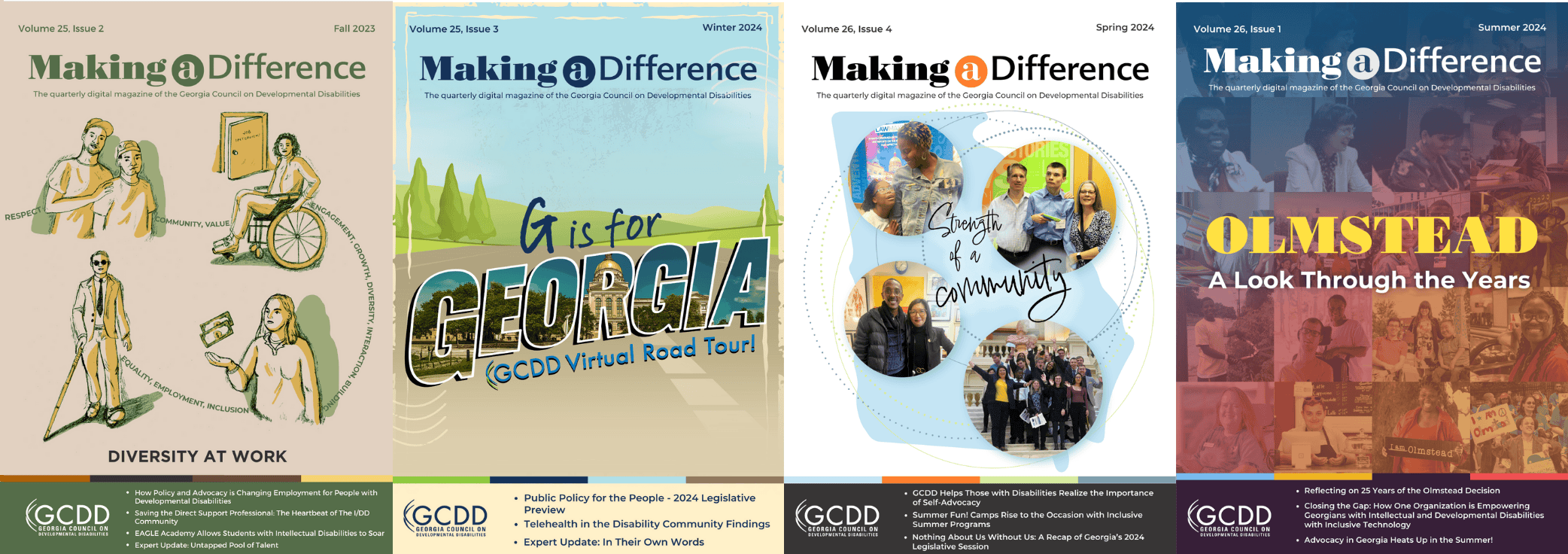GCDD FFY 2023-2024 Annual Report

The mission of the Georgia Council on Developmental Disabilities (GCDD) is to bring about social and policy changes that promote opportunities for persons with developmental disabilities (DD) and their families to live, learn, lead, work, play and worship in Georgia communities. This report shares GCDD’s impact during the federal fiscal year 2023-2024.
Contents
- Initiatives Increase Opportunities and Choice for Georgians with Developmental Disabilities
- GCDD Strategic Plan to Improve Services and Supports
- GCDD Advocacy Days: Advocates Make a Difference!
- Supporting Growth of Georgia's IPSE Programs
- Virtual Road Trip Spreads Statewide Awareness
- Celebrating the 25th Anniversary of the Olmstead Decision
- Making a Difference Magazine
- Council Members, Partners, Staff
- Budget for FFY 2023-2024
Initiatives Increase Opportunities and Choice for Georgians with Developmental Disabilities
Highlights from GCDD's FFY 2023-2024 Impact Report
In this report, GCDD shares accomplishments from the initiatives funded with statewide partners that created impactful change for Georgia’s DD community. Additionally, the Council’s policy advocacy work has been at the forefront for legislative wins for the DD community. Some of our most powerful impacts this year include:
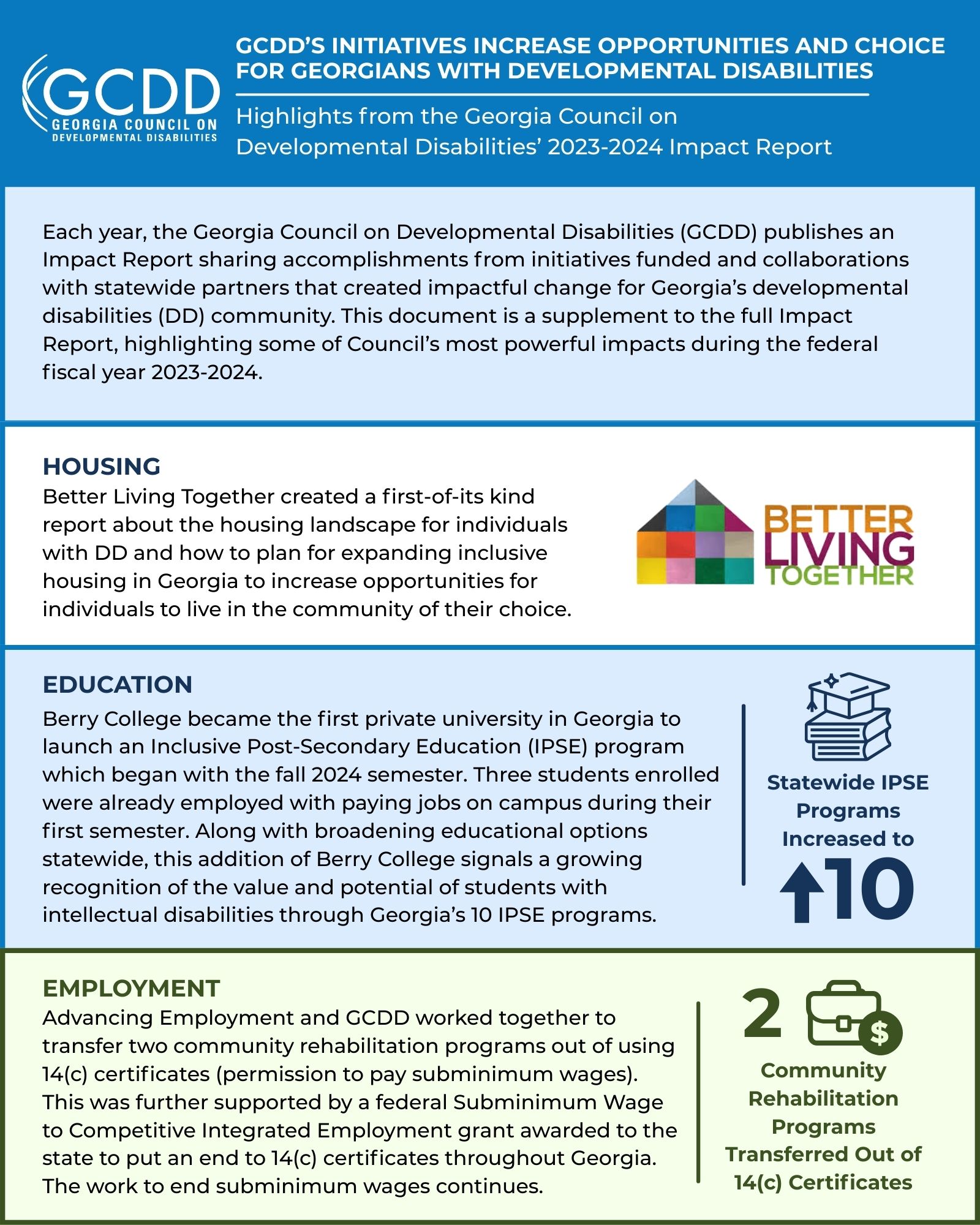 Download "Highlights from GCDD's FFY 2023-2024 Impact Report"Housing: Better Living Together created a first-of-its kind report about the housing landscape for individuals with DD and how to plan for expanding inclusive housing in Georgia to increase opportunities for individuals to live in the community of their choice.
Download "Highlights from GCDD's FFY 2023-2024 Impact Report"Housing: Better Living Together created a first-of-its kind report about the housing landscape for individuals with DD and how to plan for expanding inclusive housing in Georgia to increase opportunities for individuals to live in the community of their choice.
Education: Berry College became the first private university in Georgia to launch an Inclusive Post-Secondary Education (IPSE) program which began with the fall 2024 semester. Three students enrolled were already employed with paying jobs on campus during their first semester. Along with broadening educational options statewide, this addition of Berry College signals a growing recognition of the value and potential of students with intellectual disabilities through Georgia’s 10 IPSE programs.
Employment: Advancing Employment and GCDD worked together to transfer two community rehabilitation programs out of using 14(c) certificates (permission to pay subminimum wages). This was further supported by a federal Subminimum Wage to Competitive Integrated Employment grant awarded to the state to put an end to 14(c) certificates throughout Georgia. The work to end subminimum wages continues.
Technology Access: Results of a research study identified barriers and promising opportunities of expanding the use of technology for people with DD. Recommendations include expanding broadband access, funding enabling technologies, and including individuals in technology discussions are necessary for a more equitable future.
Public Policy: During the 2023-2024 reporting year, the Council’s policy advocacy work was at the forefront for public policy gains for the DD community. GCDD’s annual Advocacy Days were held during the Winter 2024 legislative session with 321 self-advocates and stakeholders meeting at the Georgia State Capital to educate and inform legislators about issues that are important to the DD community. Public policy gains include:
- IPSE programs received an additional $1.5 million in funding.
- Serving as technical advisors on SB 384, Georgia as a Model Employer, to increase hiring and retention of people with disabilities.
- $79 million from the Governor’s Budget, $28 million from DBHDD for a total of $107 million for the rate increase which raised NOW/COMP DSP wages on average from $10 to $16 an hour. Additionally, 100 new waivers in 2024.
GCDD’s Strategic Plan to Improve Services and Supports
GCDD is guided by its Five-Year Strategic Plan that outlines the Council’s goals and objectives. This determines what GCDD will work on to build a more inclusive, integrated Georgia for DD. The initiatives fall under the following areas of focus.
Systems Change
Initiatives focusing on change to improve community living, such as in the areas of employment, housing, and home and community-based services. For example, the University of Georgia’s Employment Technical Assistance Center has helped transform the use of 14(c) certificates in Georgia by supporting providers to transition to competitive integrated employment models. They are also creating the DB101 (Disability Benefits 101) system, which will launch in November 2025, to provide information on social security benefits. Another initiative through UnlockGA trained 30 advocates on giving testimony to the legislature. Learn about GCDD's Systems Change initiatives.
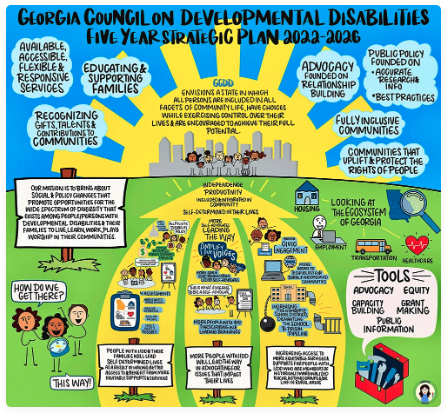
Self Advocacy
Initiatives focusing on empowering people with DD and their families to learn how to advocate for change in public policy and how to make decisions about the way they choose to live, learn, lead, work, play and worship in the community. Learn more about GCDD's Self-Advocacy initiatives.
Accessibility & Inclusion
These projects work to remove barriers so everyone can access resources and opportunities in their community. For example, the Georgia Technology White Paper Project served as a pivotal initiative aiming to bridge the digital divide by identifying barriers to technology adoption among the DD community and developing actionable recommendations to overcome these challenges. Learn more about GCDD's Accessibility & Inclusion initiatives.
Education
Initiatives focusing on supporting inclusive post-secondary education (IPSE) programs for young adults with intellectual disabilities (ID) who want to attend college. GCDD’s support has helped fund 10 IPSE programs across the state. Students with ID experience inclusive courses and programming. Learn more about GCDD's Education initiatives.
GCDD Advocacy Days: Advocates Make a Difference!
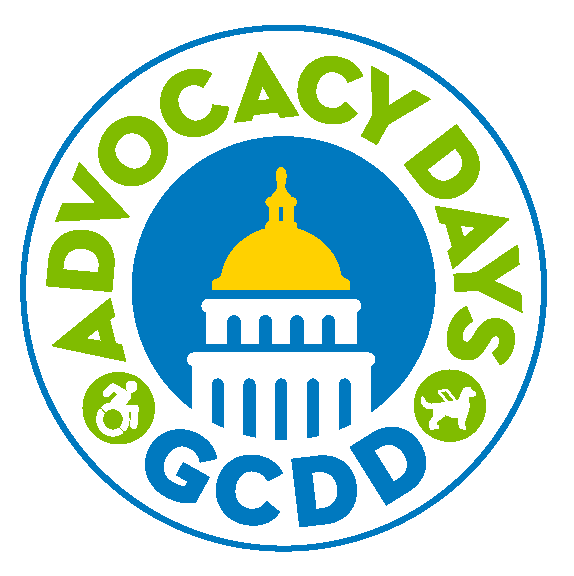 The Georgia legislative session kicked-off in January 2024, and GCDD, along with 321 advocates, were front and center to advocate for Georgia’s statewide DD community. During this time, GCDD hosted its annual Advocacy Days at the Georgia State Capitol, an opportunity for GCDD, self-advocates, and stakeholders to meet, educate, and inform legislators about issues that are important to Georgians with intellectual or developmental disabilities.
The Georgia legislative session kicked-off in January 2024, and GCDD, along with 321 advocates, were front and center to advocate for Georgia’s statewide DD community. During this time, GCDD hosted its annual Advocacy Days at the Georgia State Capitol, an opportunity for GCDD, self-advocates, and stakeholders to meet, educate, and inform legislators about issues that are important to Georgians with intellectual or developmental disabilities.
Prior to each advocacy day, GCDD held a virtual session to help advocates prepare for the legislator visits. Additionally, GCDD hosted A Seat at the Table: A Transformative Conversation Around Equity, Disability and Support, led by Story Muse and in partnership with Equitable Dinners, L’Arche Atlanta, and Out of Hand Theatre. With 175 people in attendance, the event combined art and dialogue to explore the complex issues of Home and Community-Based Services and the direct support professional (DSP) crisis. Scheduled just before GCDD’s Waivers and Wages Advocacy Day, GCDD’s Storytelling team focused the content and conversations from the dinner could be carried directly to legislators.
Day 1: Inclusive Post-Secondary Education (IPSE) Day
|
On IPSE Day, 108 advocates and IPSE students called for a $1.6 million increase in the Georgia Student Finance Commission’s budget for IPSE grants, which would bring total funding to $2.6 million to increase access to inclusive college programs for individuals with intellectual disabilities. Results: The legislature included the entire requested amount in their final budget. In fall 2024, IPSE students were able to apply for grants that go toward the cost of tuition and program fees. |
Day 2: Waivers and Wages Day
|
On Waivers and Wages Day, 120 individuals focused on advocating to reduce the 7,000+ person Medicaid Waiver waitlist for home and community-based services and increasing wages for direct support professionals (DSPs). They pushed for 2,400 new NOW and COMP waivers in the FY25 budget, additional funding towards the provider rate study, and worked on the issue of creating an I/DD Innovation Commission. Results: The legislature only allocated enough funding for 100 new waivers in the FY25 budget. This means the waitlist will remain above 7,000 individuals for at least the next year. However, the legislature fully funded the provider rate study. The proposal to create an I/DD Innovation Commission received pushback in the House and was tabled. |
Day 3: Advancing Employment First and Ending Subminimum Wage Day
|
On Employment Day, the conversations of 120 advocates centered around ending the 14(c) certificate, which permits subminimum wages for individuals with DD, and advancing Georgia as a Model Employer (Senate Bill 384). Results: SB 384 was passed with approved amendments. Advocates continued to work on the issue of ending of subminimum wages. |
Read more about GCDD’s impact during Advocacy Days: Nothing About Us Without Us: A Recap of Georgia’s 2024 Legislative Session
Supporting Growth of Georgia’s IPSE Programs
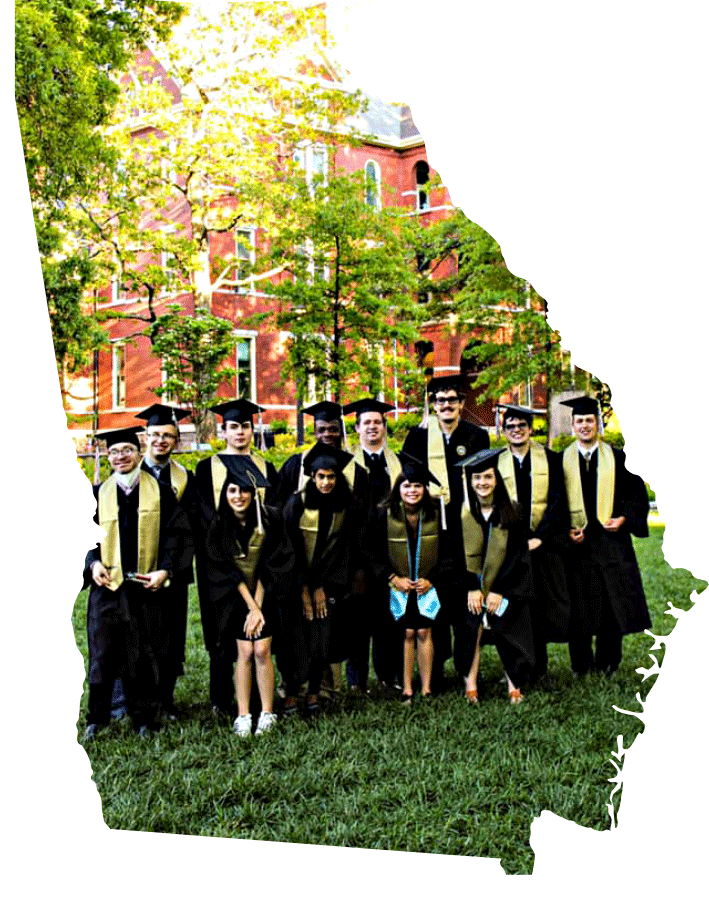 The Georgia Council on Developmental Disabilities (GCDD) is charged with distributing State of Georgia funds to universities/colleges/technical schools across the state to lead Inclusive Post-Secondary Education (IPSE) college programs.
The Georgia Council on Developmental Disabilities (GCDD) is charged with distributing State of Georgia funds to universities/colleges/technical schools across the state to lead Inclusive Post-Secondary Education (IPSE) college programs.
IPSE programs provide students with intellectual disabilities (ID) the chance to continue their education in a college setting alongside their peers. For students without a high school diploma or the credits required for mainstream universities, these programs help bridge the gap to meaningful employment and greater independence. They offer opportunities for personal growth and planning for the future, all while experiencing fun-filled college life. As of 2022, there was a 58% employment rate for students with ID who have gone to an IPSE program, compared to the 19.6% of those who have not.
In 2024, GCDD announced the addition of a new IPSE program at Berry College. The program is Georgia’s 10th IPSE program and marks a milestone by being the first private college in the IPSE consortium. The addition of Berry College not only expands the IPSE network, but also fills an important geographical need for students with intellectual disabilities in the northwest part of Georgia.
Virtual Road Trip Spreads Statewide Awareness
The Georgia Council on Developmental Disabilities (GCDD) is a statewide organization serving ALL areas of Georgia. In January 2024, GCDD launched a campaign to reach out to all regions of the state to increase awareness about GCDD and issues important to Georgians with DD.
 The campaign, called “G is for Georgia,” was a virtual road trip connecting Georgians to GCDD’s Council members, projects, partners, and individuals with DD. Leading the tour was Justin Gold, a student at Georgia State University’s IDEAL IPSE program.
The campaign, called “G is for Georgia,” was a virtual road trip connecting Georgians to GCDD’s Council members, projects, partners, and individuals with DD. Leading the tour was Justin Gold, a student at Georgia State University’s IDEAL IPSE program.
At each stop (nearly 40 cities), information and resources were shared about the community, including stories about individuals living in the area and how they have been integral in advancing and advocating for better services and supports for people with DD. Each stop was shared virtually through storytelling and videos shared on social media and through GCDD’s email list.
Along the way, the campaign also gathered valuable community stories to guide GCDD’s future initiatives, and collected additional stories from self-advocates throughout the state.
Read articles about the campaign:
Celebrating the 25th Anniversary of the Olmstead Decision
June 22, 2024 marked the 25th anniversary of the Olmstead vs. L.C. Decision. Lois Curtis, a Georgia native, disability advocate, and self-employed artist, was one of the two plaintiffs in the case. The other was Elaine Wilson. This U.S. Supreme Court decision is considered as one of the most important civil rights decisions in United States history for people with disabilities.
Reflecting on 25 years of the Olmstead Decision, there have been notable strides in promoting community integration for individuals with disabilities. Key areas of progress include:
- Increased Community-Based Services: Many states have expanded their community-based services and supports, allowing more individuals to live in their communities rather than in institutional settings. Programs such as Medicaid Home and Community-Based Services (HCBS) have been instrumental in this transformation.
- Legislative and Policy Reforms: Various legislative measures have been introduced to support the principles of the Olmstead decision. For example, the Money Follows the Person (MFP) program helps Medicaid beneficiaries transition from institutions to community-based settings.
- Advocacy and Awareness: Disability rights advocates have played a crucial role in raising awareness and pushing for reforms that align with the Olmstead mandate. Public and private initiatives have focused on educating stakeholders about the importance of community integration.
On an episode of GCDD's Pinpoint podcast, four guests shared their personal and professional knowledge of how the Olmstead Decision has and has not worked during the last 25 years. Listen to the podcast below.
Making a Difference Magazine
Want to learn more about GCDD’s initiatives and Georgia’s DD community? Read articles from GCDD’s quarterly magazine, Making a Difference. Each issue features articles on public policy, interviews with experts in the disability field, highlights from Georgia’s inclusive post-secondary education (IPSE) programs, self-advocate spotlights, and much more. The magazine is also available in Spanish and accessible audio.
Council Members, Partners, Staff
We appreciate the work of our advocates to achieve our mission to support opportunities for people with DD through increased independence, inclusion, integration, productivity and self-determination. This includes our Council members, partners, and staff who continue to serve as advocates for all persons with DD.
Our Members
The GCDD’s activities are governed by a 28-member board, appointed by the Governor with at least 60 percent of the members being individuals with DD and family members. Other members include policymakers that represent various agencies and organizations having a vested interest in persons with DD. Our members represent different areas of the state of Georgia. This year, GCDD welcomed nine new members chosen and appointed by Governor Kemp from over 100 council membership applications.
Our Staff
GCDD staff work in many capacities with the same purpose of supporting the goals of the Council to improve the lives of individuals with DD. Meet our staff.
Our Partners
GCDD operates under the authority of the federal Developmental Disabilities Assistance and Bill of Rights Act of 2000 (DD Act) and is part of a statewide DD Network that consists of three partners in each state and territory authorized under the Developmental Disabilities Assistance and Bill of Rights Act of 2000 (the DD Act) and administered by the Administration on Developmental Disabilities (ADD).
Georgia's DD Network includes:
- Georgia Council on Developmental Disabilities (Developmental Disabilities Council)
- The Center for Leadership in Disability (University Centers for Excellence in Developmental Disabilities)
- The Institute on Human Development and Disability (University Centers for Excellence in Developmental Disabilities)
- Georgia Advocacy Office, Inc. (Protection and Advocacy System)
Budget for FFY 2023-2024
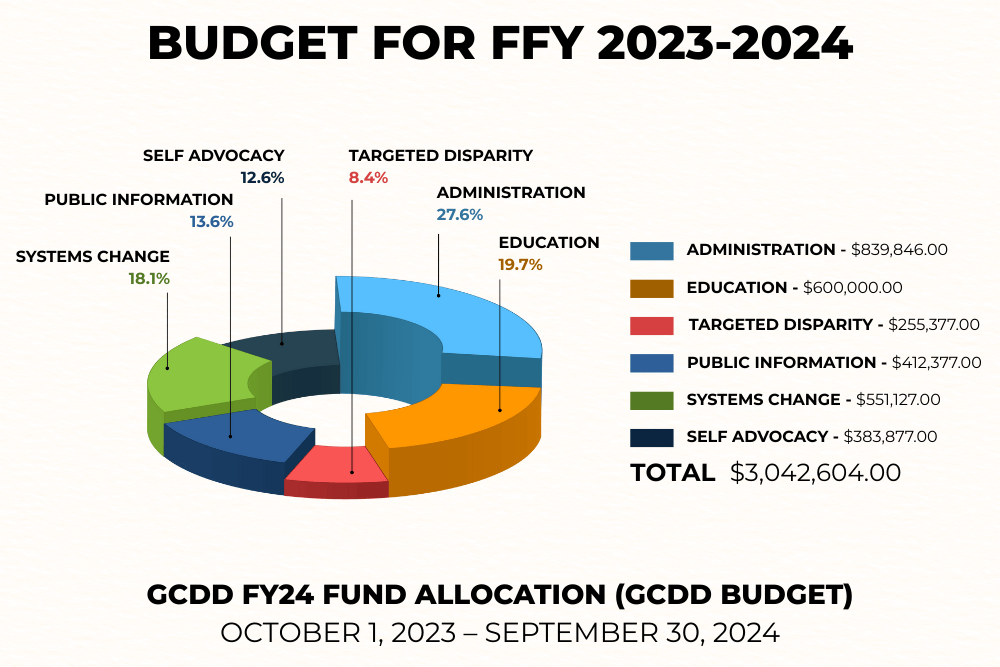
Text version of the Budget graphicGCDD FY24 Fund Allocation (GCDD Budget) |
|
| ADMINISTRATION (27.6%) | $839,846.00 |
| EDUCATION (19.7%) | $600,000.00 |
| TARGETED DISPARITY (8.4%) | $255,377.00 |
| PUBLIC INFORMATION (13.6%) | $412,377.00 |
| SYSTEMS CHANGE (18.1%) | $551,127.00 |
| SELF ADVOCACY (12.6%) | $383,877.00 |
| TOTAL | $3,042,604.00 |
